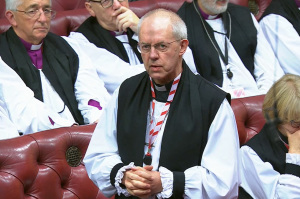'If You Build It, They Will Come' Ecclesiology
In our ongoing analysis of The Coming Evangelical Collapse we must inevitably examine what I call the "new ecclesiology" or doctrine of the church. I say new because there has been a shift in how we understand and define the church, so much so that the institution itself is being redesigned and much of its life reoriented.
Michael Spencer argues: "There are three kinds of evangelical churches today: consumer-driven megachurches, dying churches, and new churches whose future is fragile." For the purpose of clarification, the term megachurch refers to any Protestant congregation with a sustained average weekly attendance of 2000 persons or more in its worship services. This is not the type being addressed here. Simply being large is not necessarily bad. I know of many theologically orthodox, missional-minded churches that meet this criteria. Instead I am emphasizing the point made by Spencer: "consumer-driven megachurches," which is more about philosophy, affecting churches both large and small.
For many evangelicals, the consumer-driven megachurch has come to define success and thus this model, according to Spencer, remains most likely to survive the post-Christian era. I am not (nor is he) suggesting that these churches will survive because they are better or even that they should. Rather, these churches may stand a greater chance of survival because they tend to be insular, subcultural, and most accommodating to the culture. As Spencer noted, these churches are more "pragmatic, therapeutic, [and] church-growth oriented," churches whose emphases have "shift[ed] from doctrine to relevance, motivation, and personal success." Such churches are unlikely to offend, much less challenge, the post-Christian culture. In short, the culture is unlikely to be concerned with such churches. To those outside the church, they just don't matter.
The premise of the consumer-driven megachurch is rooted in the idea that you if you build it they (the lost) will come, meaning: make the institution as attractive as possible. Don't get heavy on doctrine and theology, emphasize "visitor experience," maximize programs and services, Xbox and Playstation for the youth, weight rooms, yoga classes, restaurants, and, of course, you must have a Starbucks. Megachurches appear to be competing for "consumers" by offering the most amenities. Visit such a church and you will quickly pick up on the proprietary pride felt by its members, "our church has…", "our church is…", and so on. Such statements tend to be more about the institution rather than the work and person of Christ. Outside the Sunday gathering of the church, you're likely to encounter a boastfulness subtly conveying the idea that "our church is better than your church."
Driven in large part by the belief that mere church activity produces spiritual growth, the consumer-driven model-aka seeker-sensitive-tends toward the maxim: just get 'em in the door! Willow Creek admitted to this strategy in their 2007 Reveal survey results and concluded what should have been obvious: it does not work. Whether or not their humble discovery has been received and acted upon by those caught up in the church-growth movement remains to be seen.
The new ecclesiastical premise is that the worshipping congregation exists for the lost, the person not actually in the church. Build a building, strategically located (based on the latest demographic trends/data), make it nice, and hope they come. Given this new target audience, we then make some compromises. The sermon can't focus on doctrine and theology; that might be confusing to visitors. So we jettison expository preaching-aimed at equipping the saints-for topical preaching addressing felt needs. This changes as the felt needs change and the Body never gets anything more than lowfat milk! (Recall the data demonstrating the staggering theological illiteracy in America).
Given the massive numbers of people that this model attracts, there is the practical requirement for countless volunteers just to manage operations. Add to this the need for hundreds of Bible study leaders, Sunday school teachers, and children's workers, and standards begin to drop in order to fill practical needs. Business models and strategies are emphasized over and against theological depth. I have sat in such churches, attended Bible study classes only to be shocked by the ignorance of those teaching. Many are completely ignorant of church history and the most basic theological terms and concepts and those responsible for providing oversight and guidance are mostly unaware of what is missing. It is often the blind leading the blind.
Don't misunderstand me, I'm not saying the lost are prohibited from participating in Christian worship-certainly not. As a famous twentieth-century theologian, rightly expressed this, "The church exists by mission as fire exists by burning." The problem here is one of seriously misplaced emphasis. The church is the body of Christ. The body of Christ is called to be distinct from the world, being those who have been made "alive together with Christ" (Eph. 2:5; emphasis mine), "fellow saints and members of the household of God" (Eph. 2:19). And to this body, Christ gave "pastors and teachers to equip the saints for the work of ministry, for the building up of the body of Christ, until we attain to the unity of the faith and of knowledge of the Son of God, to mature manhood … so that we may no longer be children, tossed to and fro … and carried about by every wind of doctrine, by human cunning, by craftiness in deceitful schemes." Making "the body grow … so that it builds itself up in love" (Eph. 4:11–16).
Paul later contrasts this body with those who walk "in the futility of their minds … darkened in their understanding, alienated from the life of God" (Eph. 4:17–18). Clearly, the New Testament emphasizes that the church is a distinct people who are called together by God through grace for worship, fellowship, to be trained for the "work of ministry," and then sent by Jesus "into the world" (John 17:18) so that the world may know God and his great love for them that was demonstrated on the cross (see John 17:21–23). We do not await the lost to come to us; we are sent to them and for this work, the Scriptures emphasize preparation. That is the work of the institutionalized church; the church exists for equipping the people of God for the mission of God, the administration of the sacraments, and ultimately the worship of the triune God by those who have experienced his saving grace.
Might this biblical understanding of the church better serve the purpose of reaching the world for Christ? Let's stop watering down the Word, begin equipping the saints, "sanctified in the truth," and go into the world. Rather than men building institutions in hopes that they come, let Christ build his church and obey his command to go to them.





























